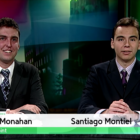By ERIC FREEDMAN
Capital News Service
LANSING — Pesticides, mostly from agricultural runoff and yard use, remain a concern for fish and insects in many of the country’s streams and rivers, warns a national study based in part on research done in Michigan. Although levels of pesticides usually didn’t exceed benchmarks for human health, their potential to harm aquatic life is likely underestimated, according to a recent study by the U.S. Geological Survey, part of the U.S. Interior Department. That’s because the agency can afford to monitor “less than half of the more than 400 pesticides currently used in agriculture, and monitoring focused only on pesticides dissolved in water.”
U.S. farms use more than half a billion pounds of pesticides each year to boost crop production and reduce insect-borne disease. “Some of these pesticides are occurring at concentrations that pose a concern for aquatic life,” the Geological Survey said. An environmental scientist at Michigan State University’s Kellogg Biological Station said the study shows a need for more research about “potential interactive effects of pesticides and other organic contaminants in aquatic ecosystems.
“The report is important as the best systematic evaluation we have,” said Stephen Hamilton, a professor of ecosystem ecology and biogeochemistry at the research station near Kalamazoo.
